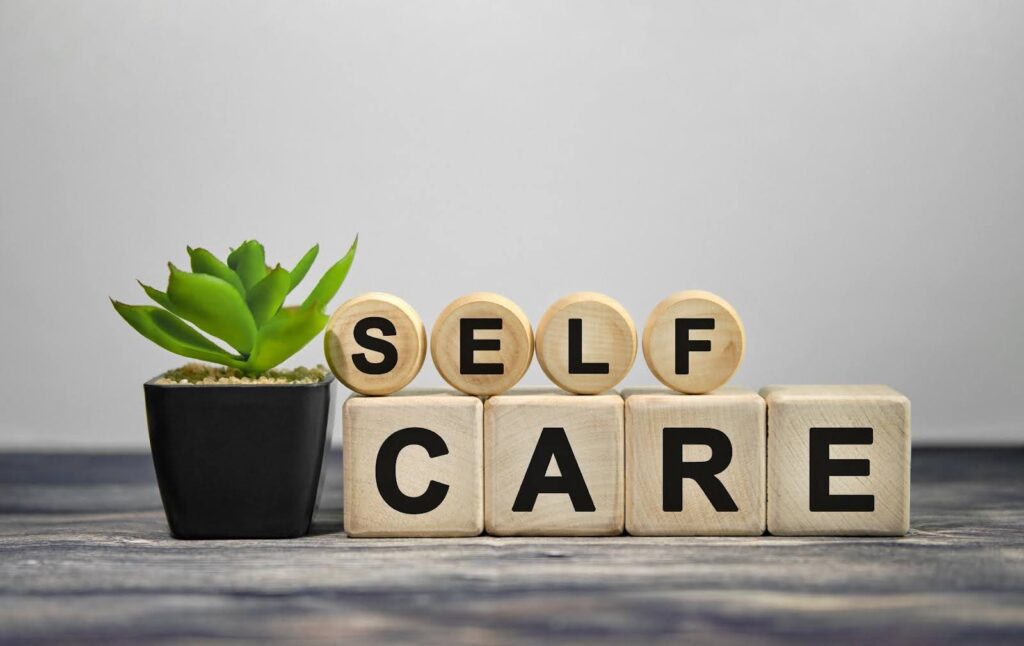Self-care has become a bit of a buzzword in recent years. But it’s so much more than pampering yourself with expensive things or lavish getaways. Rather, self-care is about finding small ways to prioritize your well-being every day.
Yet, it can still be difficult. Work, life, relationships, problems can often take the driver’s seat in our lives, leaving little room to focus on our own needs.
How often do you put yourself first? How often do you do things simply because they’re good for you, mentally, emotionally, or physically?
Even though the concept of self-care is simple, so many people struggle to prioritize it. If that sounds familiar, let’s cover a few reasons why it can be difficult, and what you can do to overcome those challenges.
A Negative Thought Process
There’s no question that we’re living in a stressful, often negative world. When you let negative thoughts wear you down and take over your mind, focusing on anything else — especially positive things, is difficult.
You might simply feel worn down and too angry, overwhelmed, frustrated, or sad to think about self-care. Unfortunately, this creates a vicious cycle. Self-care can make it easier to transform your thoughts into healthier ones.
Social Stereotypes
Some people don’t prioritize self-care because they’re worried about how others might perceive them. In some groups, self-care might be seen as lazy or selfish.
Nothing could be further from the truth.
Prioritizing your well-being isn’t selfish, and it actually takes work. When you take care of yourself every day, you’re putting your best foot forward. You’ll be more likely to have more energy and a positive attitude, and you can even be a better influence on others in your life. Don’t let negative stereotypes keep you from the care you deserve.
Identifying Different Needs
Maybe you’ve tried different “traditional” self-care practices before. You’ve had a spa day. You’ve practiced yoga or meditation. You’ve taken a vacation. Maybe you even spent a few days sleeping in to get a few extra hours of shut-eye. But, if those things didn’t make you feel better, you might think self-care is just some kind of marketing ploy.
Again, nothing could be further from the truth.
Self-care needs are different for everyone. You don’t have to participate in things that aren’t helpful or useful to you just because they seem to work for others.
Focus on small things you can do each day to improve your mental, emotional, and physical health. For example, if you have a stressful job, could a specific morning routine help reduce stress and get you ready for the day? If you struggle with anxiety, maybe daily exercise can help distract you and give you a boost of endorphins.
Finding a self-care routine that reflects your needs and fits your lifestyle will make it easier to stick with these practices. Do the things that bring you joy and boosts your energy.
Self-Criticism
Some people don’t prioritize self-care because they feel like they aren’t worthy. Self-esteem issues can wreak havoc on your mind, contributing to you believing that you don’t deserve basic care practices. You might even feel guilty when you introduce self-care into your routine.
If constant rumination has caused you to believe you’re not worthy of self-care, it’s important to fight against those negative thoughts. You don’t have to do it alone. Lean on your support system, or consider reaching out for professional help if your self-criticism and lack of confidence keep you from the care you need.
Self-care shouldn’t feel overwhelming. It should be something you look forward to each day. If you’re struggling to prioritize these moments of care each day, feel free to contact Onyx Counselling and Psychology to set up an appointment. Our team of skilled and compassionate therapists can work with you to identify why you might be having difficulties and implement effective strategies to help you incorporate more self-care practices into your routine.
Connect with our office to schedule your first appointment.



